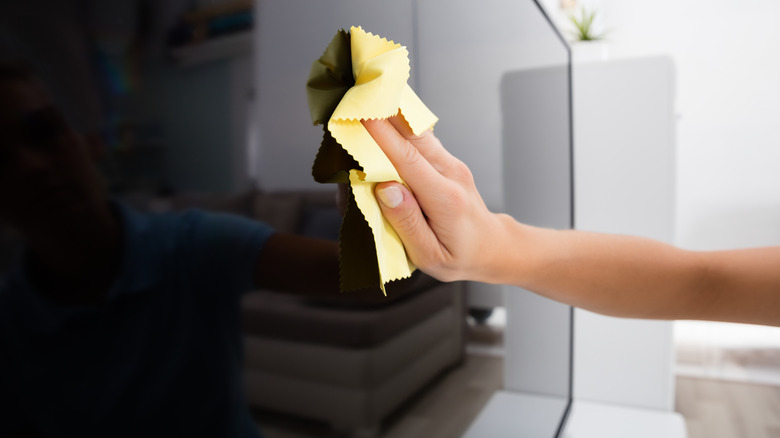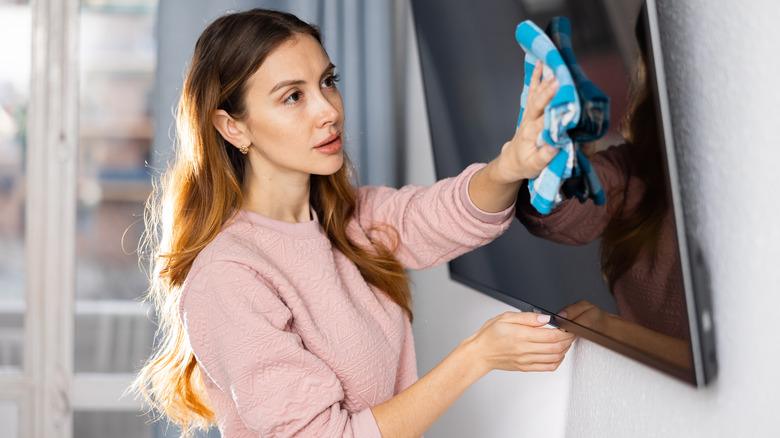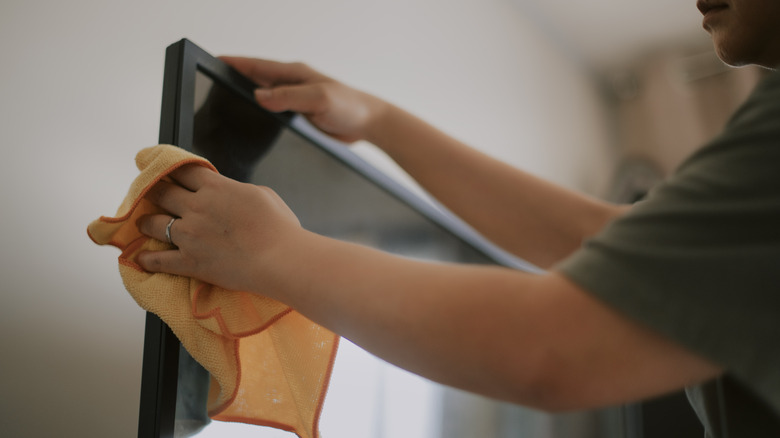You Should Never Use Glass Cleaner On A TV Screen - Here's Why
Even though TVs are not usually touchscreen devices and thus don't generally get grubby fingerprints like your smartphone or tablet screen does, they still attract dust, dirt, and debris. Along with the bezel, it's important to keep the actual TV screen clean. While cleaning, you might be tempted to use the same glass cleaner you use to clean windows and mirrors, but this isn't a good idea.
Glass cleaners can actually damage a TV screen because of the anti-glare coating that's on most modern TVs. The solvents in traditional glass cleaners can strip away this coating, resulting in streaks, smudges, or even discoloration. This impacts not only the picture while you're watching content, but also makes for an unsightly view when the TV is off.
So, what should you do? The simplest and most effective solution is to use distilled water, which doesn't leave behind hard-water deposits, with a drop of mild soap. Alternatively, you can use tech screen cleaning solutions, though it's important to make sure that the one you choose is safe for TV screens. Both should be applied directly to a soft microfiber cloth, not the screen itself, then wipe the screen using a slow and gentle motion.
Why you shouldn't use glass cleaner
Glass cleaners usually contain a mix of chemicals like alcohol and ammonia. These chemicals can damage the surface of an LCD screen. While you might be someone who swears by natural vinegar and water to clean surfaces, it should not be used on TV screens because vinegar can still damage the screen's coating. Cleaning powders can also contain substances that are harmful to a TV screen.
If the TV has a severe stain, you can use a mix of distilled water with disinfecting ethanol. But only use a small amount, do not press hard while cleaning, and wipe the solution off quickly. Follow it up with a wipe down using a dry, microfiber cloth, which will remove any oils and moisture that remains.
Whatever solution you use, the water or substance must be sprayed onto the cloth, not the screen directly, because if water drips from the screen or permeates its surface, it can result in components breaking down. When in doubt, consult the TV's manual to see the manufacturer's recommendations for cleaning and to prevent voiding a warranty.
How to clean a TV screen
To clean the screen on one of the best smart TV models, first turn it off and let it cool down. Spray your cleaning solution onto a clean and dry microfiber cloth. Press lightly in a circular motion, moving around section by section to cover the entire surface. The latest LED and OLED TVs are especially delicate, so it's important not to apply pressure. Use a separate dry microfiber cloth for a final, low-pressure finishing touch wipe.
Note that not all screen cleaners labeled as such are safe to use on all TVs. Check the ingredients alongside the recommendations from your TV manufacturer. See if the screen cleaner has a list of compatible screen types on its website. If you're unsure, the TV manufacturer may provide its own approved cleaning solution. Otherwise, play it safe and stick with plain distilled water with a drop of mild soap. With proper care, even cheap TVs can last for 45,000 hours or more of use. Using the right cleaning solution can go a long way in keeping your TV looking great and operating effectively.


